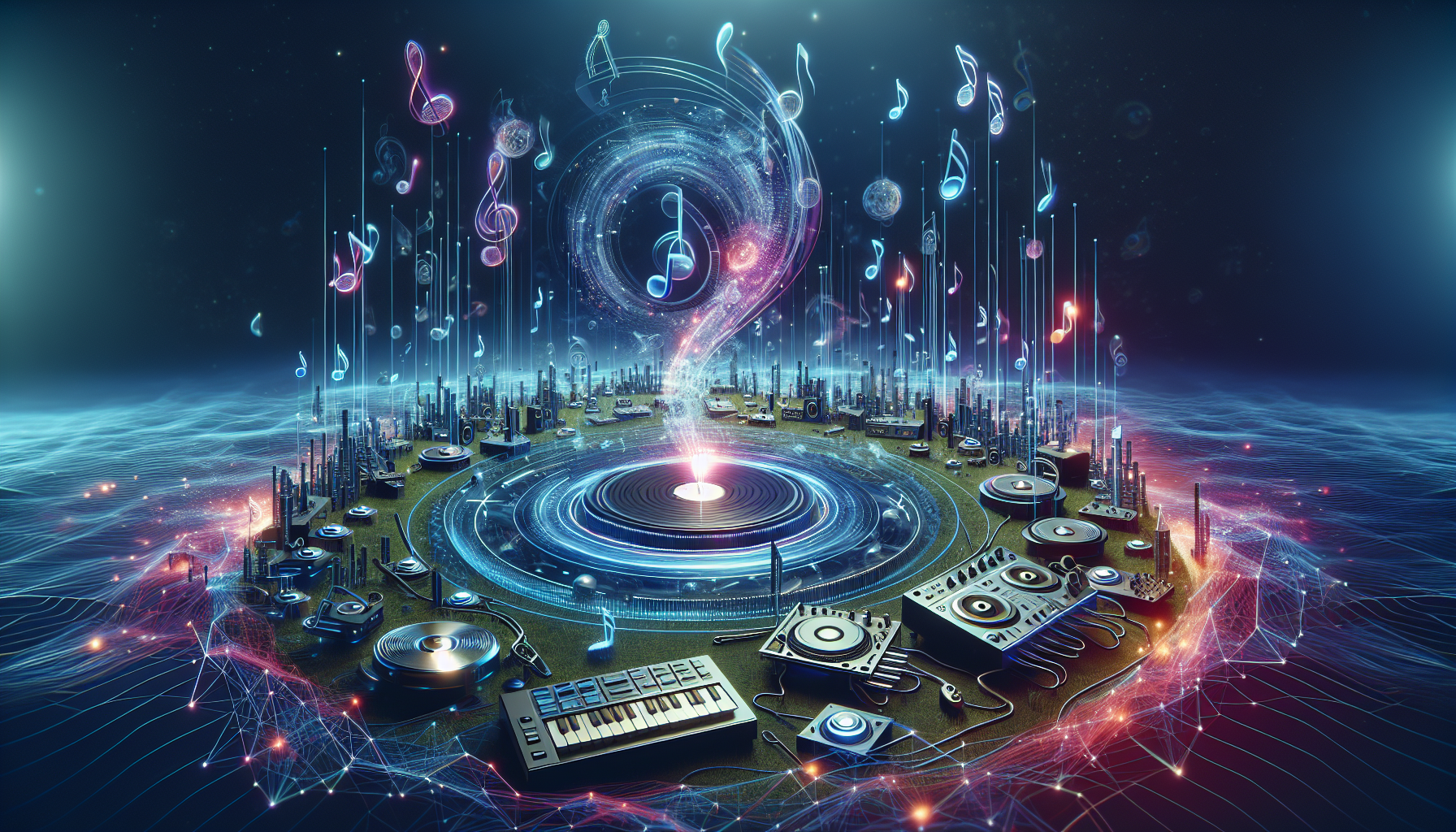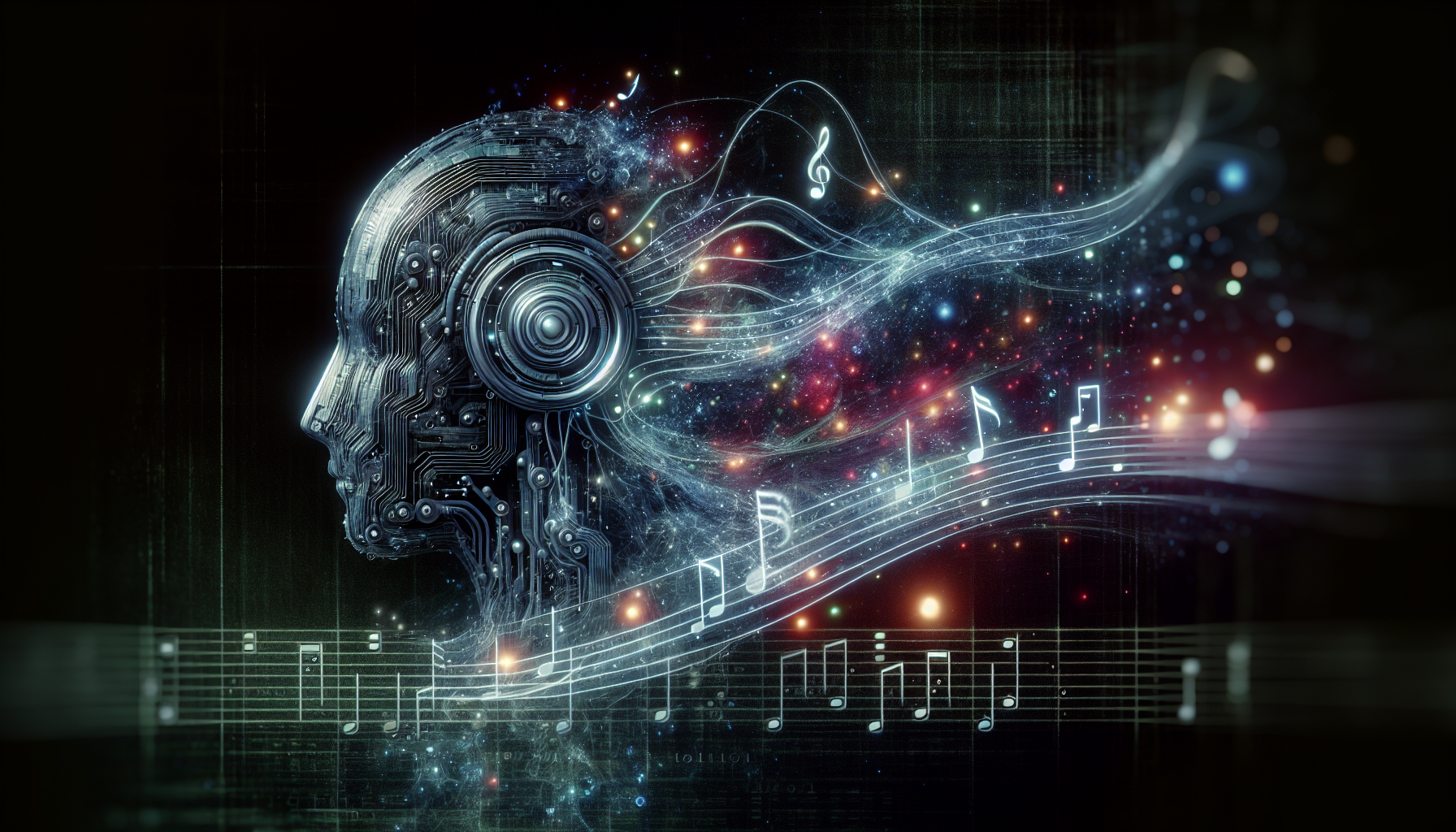Paul
Jun 21, 2024
Table of Contents |
How is AI creating the next hit songs? AI music composers are changing the music industry, from pitch correction to generating complete music tracks. This article explores the technology behind AI music composition, reviews leading AI music tools, and looks at future trends in AI-generated music.
Key Takeaways
- AI music tools empower both professionals and amateurs to easily produce original, high-quality music using advanced algorithms and deep learning techniques
- Despite AI’s growing role in music creation, balancing AI efficiency with the emotional depth that human musicians provide remains vital. Human artists contribute irreplaceable emotion and experience, sparking ongoing debates about the ethical impact of AI on the industry.
How AI Music Composers work

The secret behind AI’s music-generating ability lies in its learning process. It digests vast amounts of music data, identifies patterns, and understands style nuances. Trained on these datasets, AI music composers can autonomously produce complete tracks, from intricate melodies to lush harmonies, without direct human intervention.
These AI music generators, powered by neural networks and deep learning, can comprehend and recreate complex musical structures. Sometimes, they employ Generative Adversarial Networks (GANs) to produce results that blur the line between AI-generated and human-composed music.
| Neural Networks | 🧠 Computing systems inspired by the human brain's neural networks, used for pattern recognition and machine learning. |
|---|---|
| Generative Adversarial Networks (GANs) | 🤖 A class of AI algorithms used to generate new data by pitting two networks against each other. |
| Deep Learning | 🔍 A subset of machine learning involving neural networks with many layers, enabling the analysis of large datasets. |
How AI Music Composers Work in Detail
| Step | Description |
|---|---|
| 📊 Data Collection | AI collects vast amounts of music data, learning from a diverse range of genres, artists, and styles to understand the foundations of music composition. |
| 🧠 Training Model | Using neural networks, the AI is trained on the collected data, recognizing patterns and structures in the music to generate new compositions. |
| 🎶 Sampling | AI creates new music samples by blending learned patterns, ensuring each piece is unique while maintaining musical integrity. |
| 🔍 Evaluation | The generated music is evaluated for quality and similarity to the training data, using both quantitative metrics and human judgment. |
| ⚙️ Improvement | Based on feedback and evaluation, the AI model is refined and improved to produce even higher quality music. |
| 🚀 Implementation | Once the AI-generated music meets the desired standards, it is implemented for use in various applications, from background scores to full-fledged songs. |
Popular AI Music Tools
A host of popular AI music tools have emerged, streamlining music production for both professionals and enthusiasts. Leading the way, Boomy and Soundraw offer users the ability to generate their own tracks with a level of customization that rivals traditional music creation. These tools not only automate mixing and mastering but also provide platforms for collaboration and community building among artists.
With the likes of Beatoven.ai and Mubert, even those with minimal musical background can produce music, including background music, that is both original and royalty-free.
Lalals AI Tools
Lalals distinguishes itself in the AI music industry with a unique tool that lets users create tracks by describing their preferences. This platform enables the rapid production of radio-ready tracks with studio-quality vocals in multiple languages.
Moreover, Lalals’ AI voice cloning feature has seen wide adoption, with notable uses including Drake and Ariana Grande their AI voices, highlighting the platform’s reach and versatility.
Crafting Unique Melodies with AI

In the composition of original music, generative AI acts as a transformative force. It offers a diverse palette of melodies, harmonies, and rhythms gleaned from a wealth of musical data. More than just a tool, this technology serves as a collaborator that enhances musical creativity and gives artists a canvas to experiment with new sounds and styles.
Whether it’s personalizing music to match a mood or overcoming a creative block, AI music tools including the innovative music generator, serve as a source of inspiration and a means to expedite the composition process, allowing users to create music through ai generated songs. Read more…
AI Music Composers vs. Human Musicians

The discourse on AI versus human musicians finds its pivot in striking a balance between efficiency and emotional depth. While AI can churn out a complete song in mere seconds, it often falls short in delivering the emotional resonance that defines much of the music we love. Human composers bring an irreplaceable touch of human emotion and experience, crucial elements that AI has yet to master.
While AI music composers are creating ripples, they enhance, rather than replace, the rich tapestry woven by human creativity in music.
Case Studies: AI Generated Hit Songs
A landmark moment in AI-generated music is the creation of the song “Daddy’s Car,” produced by Sony’s CSL Research Laboratory. This track was composed entirely by an AI system called Flow Machines, which was trained on a vast database of music. The AI was able to generate melodies and harmonies in the style of The Beatles, producing a song that closely emulates the iconic sound of the 1960s band.
“Daddy’s Car” exemplifies the potential of AI to create original music that is both stylistically accurate and innovative. The song’s production involved human musicians as well, who arranged and refined the AI-generated content to create the final piece. This collaboration between AI and human creativity highlights the transformative possibilities of AI in music production, where machines can assist in the creative process and expand the boundaries of musical composition.
Ethical Considerations in AI Music Generation
The continuous creation of music by AI raises significant ethical concerns. Issues include copyright ownership, the authenticity of art, and the potential displacement of human musicians. Furthermore, using AI to replicate the voices and styles of well-known artists has ignited debates. These discussions focus on the commodification of personal artistic expression and its broader impacts on the music industry. Moreover, the cultural implications of AI-generated music, which may not reflect the rich diversity of human music, cannot be overlooked. Therefore it is important to understand that AI is here to boost, inspire, and enhance your music production; not to replace it.
Future Trends in AI Music
A future of more personalized and adaptive experiences is predicted for AI music, wherein generative music reacts to real-time inputs like biometrics, thereby crafting evolving soundscapes in sync with the listener. Innovations like Soundraw’s melody editor exemplify the shift towards music that changes and adapts in response to user feedback.
The dynamic nature of AI music suggests a future where creations on platforms like Apple Music are not just static but immersive experiences. These experiences reflect the listener’s state and environment, catering to music lovers’ diverse needs.
| Trend | Description |
|---|---|
| 🎼 Advanced Music Creation | AI's role in music creation will expand, offering advanced tools for composers and artists to generate complex compositions and innovative sound designs. AI collaborations will enable high-quality music production. |
| 🎧 Enhanced Personalization | AI algorithms will offer more personalized playlists and tailored recommendations, providing listeners with music experiences that closely match their tastes and moods. |
| 🎤 AI in Live Performances | AI will enhance live music performances through real-time sound adjustments and interactive elements, creating immersive and engaging concert experiences. |
| ⚖️ Ethical and Legal Considerations | As AI-generated music becomes more prevalent, legal and ethical issues such as copyright ownership, attribution, and the use of AI to mimic artists' voices will need to be addressed. |
| 🎚️ Integration of AI in Music Production Tools | AI-powered tools like Izotope’s Ozone, BABY Audio’s TAIP, and Sonible’s smart2 are becoming industry standards, helping musicians and producers achieve professional-quality results more efficiently. |
| 🎵 Genre Fusion and Hybrid Music | The blending of different musical genres facilitated by AI will continue to grow, pushing the boundaries of traditional music categories and creating unique sounds. |
| 📈 Rise of Niche Genres | AI's ability to cater to specific tastes will help niche genres gain more prominence, with streaming services playing a crucial role in promoting these micro-genres. |
| 🤝 AI as a Creative Partner | AI will increasingly be seen as a collaborator, helping musicians overcome creative blocks, generate new ideas, and explore uncharted musical territories. |
Summary
Reflecting on the blend of artificial intelligence and musical creativity, it’s clear that AI has secured its role in the music industry and is set to redefine it. The emergence of AI music tools and the creation of unique melodies highlight AI’s profound and varied influence, alongside important ethical considerations. Looking ahead, AI’s potential to enhance how we create, experience, and value music is undeniable.
Frequently Asked Questions
All you need to know about Lalals.
Can AI music generators create completely original songs?AI music generators can create completely original songs by learning from vast datasets of music and generating unique melodies and harmonies without direct human intervention. This capability allows them to produce music that is distinct and unprecedented in nature. |
Do AI music tools replace human musicians?No, AI music tools do not replace human musicians because human musicians bring emotional depth and human experience to music that AI cannot replicate. |
How do Lalals AI tools stand out among other AI music generators?Lalals AI tools distinguish themselves in the AI music generator market by enabling users to create songs through descriptions and offering voice cloning capabilities. They also provide full commercial and publishing rights, enhancing their market distinction. |
Are there ethical concerns with AI-generated music?Yes, there are ethical concerns with AI-generated music, such as copyright issues, impact on human artists’ earnings, and authenticity of art. These concerns raise important questions about the future of music creation and its impact on artists’ livelihoods. |
What are the future trends in AI music?In the future, AI music is poised to evolve, leveraging real-time data to generate adaptive soundscapes and offer dynamic musical experiences. AI is poised to revolutionize the music industry with these trends. |
Convert Your Voice with AI
Make your voice sound like those of famous arists.
Join Lalals and use our hyper-realistic voice converter now.